Zetta Elliott's Blog, page 25
June 8, 2018
SWaG 2018!
 Yesterday was *such* a great day! Weeks ago I got a text from Jaqueline Woodson asking me if I’d be interested in giving a keynote for the NYC Dept. of Education’s conference on Sexuality, Women, and Gender (SWaG). I thought for a moment before texting back, “Thanks for thinking of me but I’m not sure I’m qualified to”—and then I stopped myself. I put the phone down and thought a while longer. Was I qualified? Ten years ago when I was a junior professor teaching a course on Black feminism(s) at a women’s college, I would have said, “Sure!” But I’ve been out of the academy and out of the classroom for quite a while. I regularly have to Google things that my younger friends post on Facebook because I don’t know what the acronyms mean. But this conference was for NYC teachers; they weren’t experts, they were expecting to learn more about SWaG. Would it help if I stood up and said, “I know some things but I’m still learning, too?” So I erased the half-composed text and sent another: “Thanks for thinking of me! Please do give them my contact information.” Then when I heard from Kimberly Shannon and Jared Fox, I hedged again and gave them the name of my friend, Maya Gonzalez, who has published extensively on gender and sexuality. Maya’s battling two plagiarists right now, so I felt it was
Yesterday was *such* a great day! Weeks ago I got a text from Jaqueline Woodson asking me if I’d be interested in giving a keynote for the NYC Dept. of Education’s conference on Sexuality, Women, and Gender (SWaG). I thought for a moment before texting back, “Thanks for thinking of me but I’m not sure I’m qualified to”—and then I stopped myself. I put the phone down and thought a while longer. Was I qualified? Ten years ago when I was a junior professor teaching a course on Black feminism(s) at a women’s college, I would have said, “Sure!” But I’ve been out of the academy and out of the classroom for quite a while. I regularly have to Google things that my younger friends post on Facebook because I don’t know what the acronyms mean. But this conference was for NYC teachers; they weren’t experts, they were expecting to learn more about SWaG. Would it help if I stood up and said, “I know some things but I’m still learning, too?” So I erased the half-composed text and sent another: “Thanks for thinking of me! Please do give them my contact information.” Then when I heard from Kimberly Shannon and Jared Fox, I hedged again and gave them the name of my friend, Maya Gonzalez, who has published extensively on gender and sexuality. Maya’s battling two plagiarists right now, so I felt it was  important that she be recognized as the groundbreaking gender justice advocate she is and has always been. Then I talked to Kimberly Shannon, Gender Equity Coordinator at the DOE’s Office of Counseling Support Programs, and she told me they were going to have *two* keynotes, with mine focusing on girls of color (the other speaker was Janson Wu, executive director of GLAD). At that point my confidence came back and I started getting really excited about all the possibilities…almost two years ago I downloaded the July 2016 NCTE special issue on Black Girls’ Literacies (BGL), but I didn’t READ it until Edith Campbell brought BGL into our upcoming ALA panel on Black girls, magic, and brilliance. I started taking notes and making up slides; I found this awesome photo of Audre Lorde, Barbara Smith, Cherrie Moraga, and Beverly Smith. I knew I had too much material for a forty-minute talk so I cut and condensed and thought I’d put only the essentials into my notes. Then I arrived at LaGuardia HS, g
important that she be recognized as the groundbreaking gender justice advocate she is and has always been. Then I talked to Kimberly Shannon, Gender Equity Coordinator at the DOE’s Office of Counseling Support Programs, and she told me they were going to have *two* keynotes, with mine focusing on girls of color (the other speaker was Janson Wu, executive director of GLAD). At that point my confidence came back and I started getting really excited about all the possibilities…almost two years ago I downloaded the July 2016 NCTE special issue on Black Girls’ Literacies (BGL), but I didn’t READ it until Edith Campbell brought BGL into our upcoming ALA panel on Black girls, magic, and brilliance. I started taking notes and making up slides; I found this awesome photo of Audre Lorde, Barbara Smith, Cherrie Moraga, and Beverly Smith. I knew I had too much material for a forty-minute talk so I cut and condensed and thought I’d put only the essentials into my notes. Then I arrived at LaGuardia HS, g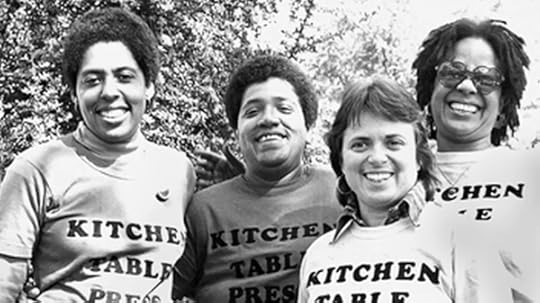 ot a warm welcome from Jared and Kim, and caught the tail end of Janson’s talk. Set up was easy since they’d already loaded my slideshow onto the computer; I was given my mic to clip on and I was ready to go! I didn’t stray too far from the podium even though I had a remote to advance the slides. But I love the photo Kim took during my talk: as I get closer to the audience, watching over me are my younger selves, happy and confident. And that’s exactly how I felt by the time I finished my keynote. Not sticking to my notes meant I freestyled and went over my allotted time, but the conference attendees didn’t mind and encouraged me to keep going. Afterwards folks thanked me for my presentation and today I received an invitation from a principal whose staff “raved” about my contribution to the SWaG
ot a warm welcome from Jared and Kim, and caught the tail end of Janson’s talk. Set up was easy since they’d already loaded my slideshow onto the computer; I was given my mic to clip on and I was ready to go! I didn’t stray too far from the podium even though I had a remote to advance the slides. But I love the photo Kim took during my talk: as I get closer to the audience, watching over me are my younger selves, happy and confident. And that’s exactly how I felt by the time I finished my keynote. Not sticking to my notes meant I freestyled and went over my allotted time, but the conference attendees didn’t mind and encouraged me to keep going. Afterwards folks thanked me for my presentation and today I received an invitation from a principal whose staff “raved” about my contribution to the SWaG 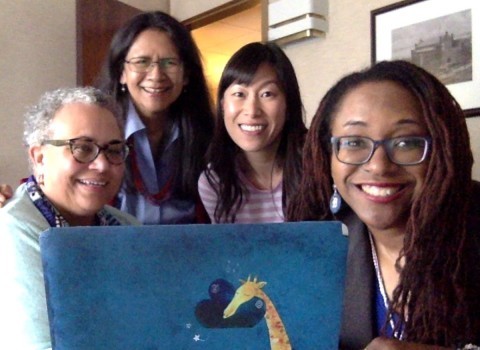 conference. It really was a phenomenal line-up—so many informative sessions for educators to attend. I headed back to Brooklyn and ran into a friend I hadn’t seen since the ’90s when we worked at the Sista II Sista Freedom School. Then I got a pint of ice cream and hit the couch! But couldn’t really rest because I was still energized by the conference. Look at the awesome tote bag (above) that they designed; I posted that pic on Facebook and so many friends wanted one of their own. It was such a privilege to be a part of SWaG 2018! And I still have plenty of notes that didn’t make it into the presentation, so I might use them in an essay. I’m very grateful for the women scholars and IPOC activists—the original #DiversityJedi!—upon whose work I stand!
conference. It really was a phenomenal line-up—so many informative sessions for educators to attend. I headed back to Brooklyn and ran into a friend I hadn’t seen since the ’90s when we worked at the Sista II Sista Freedom School. Then I got a pint of ice cream and hit the couch! But couldn’t really rest because I was still energized by the conference. Look at the awesome tote bag (above) that they designed; I posted that pic on Facebook and so many friends wanted one of their own. It was such a privilege to be a part of SWaG 2018! And I still have plenty of notes that didn’t make it into the presentation, so I might use them in an essay. I’m very grateful for the women scholars and IPOC activists—the original #DiversityJedi!—upon whose work I stand!
May 31, 2018
escape (to) the country
 Getting around London is easy, but saying goodbye to a dear friend is not. I’m so glad I was able to visit Mary last weekend. When I learned two weeks ago that she had terminal pancreatic cancer, I immediately checked online for flights. Then I realized she might want privacy at this difficult moment in her life, so I sent a card asking if I could see her. No longer living in London, Mary now lives with her daughter in Cranleigh, a beautiful village in Surrey. I’ve watched countless episodes of Escape to the Country and in a way I got my own sort of escape—I got to leave the US behind for a few days and not think about all the horrific things the current president is saying and doing. Unlike in Canada, UK news doesn’t lead with reports about Trump, and what a relief that was. Other than spending over two hours in line to clear Customs at Heathrow, my weekend getaway was lovely. The delay at Customs made visiting the British Museum impossible; it was chilly on Friday morning so I got a cup of cocoa instead and then took the train to Stratford to meet my friend Adrienne. She took me to lunch and we discussed gentrification, the royal wedding, and the Windrush scandal. Then I took the Tube to Waterloo Station and got a commuter train to Guildford followed by a bus to Cranleigh. By that point my phone had just enough juice left to guide me to Mary’s front door. I left my cord at home and so couldn’t recharge, which was good. We had a quiet weekend. On Friday night we caught up and then watched the royal wedding from the beginning; that might have been too much because Mary slept most of the day on Saturday. That didn’t bother me; I tried to make myself useful and spent some time writing and reading. Mary’s friend Christine managed her medication and called the visiting nurse when we felt it was necessary. Mary’s eyes still sparkle when she smiles and she thanked me for coming. She also apologized several times over the weekend, which no sick person should ever have to do. But cancer is humbling, taking away much of the control we’re accustomed to when it comes to our bodies. While Mary was resting, Christine and I shared our cancer stories. Who hasn’t lost a loved one to that disease? Strange to consider how cancer has created so many different communities. When I got home on Monday, I found a voicemail from my aunt in Nevis; she just wanted to send her love on the anniversary of my father’s death (May 26). Even though I talked about him all weekend, I hadn’t remembered the anniversary, which always feels like the wrong word to use. My brother got married on that day, so it is his anniversary. For me? It’s just a day. Watching a loved one die is so painful and as Christine remarked, “Cancer is chaos.” That’s mostly what I remember about caring for my father, but spending the weekend with Mary was the exact opposite. Everything seemed calm and even when we were concerned, the visiting nurses came right away and took control. I’m putting together a care package now and will send it express. Mostly it’s for Mary’s grandkids who understand that she’s sick but not that she won’t get better. Working on a picture book, too, and wrote a poem while I was in Cranleigh. The only hard part of the visit was saying goodbye. I didn’t cry in front of Mary but my eyes were leaking for the rest of the day. My friend Clare understood when I bailed on our plans. Instead I walked through Hyde Park, resisted the carousel but got an ice cream cone. Just walked till my feet hurt and then holed up in the hotel and tried to process it all. There’s no point talking about fairness. It’s cancer. Indiscriminate. Heartbreaking. And yet I left Cranleigh feeling closer to Mary, and Christine offered me a place to stay in London when I next cross the pond. Mary’s daughter got a much-needed break, and I contacted another friend in the US so she can visit Mary while there’s still time. Cancer brings people together, which means we don’t have to mourn alone.
Getting around London is easy, but saying goodbye to a dear friend is not. I’m so glad I was able to visit Mary last weekend. When I learned two weeks ago that she had terminal pancreatic cancer, I immediately checked online for flights. Then I realized she might want privacy at this difficult moment in her life, so I sent a card asking if I could see her. No longer living in London, Mary now lives with her daughter in Cranleigh, a beautiful village in Surrey. I’ve watched countless episodes of Escape to the Country and in a way I got my own sort of escape—I got to leave the US behind for a few days and not think about all the horrific things the current president is saying and doing. Unlike in Canada, UK news doesn’t lead with reports about Trump, and what a relief that was. Other than spending over two hours in line to clear Customs at Heathrow, my weekend getaway was lovely. The delay at Customs made visiting the British Museum impossible; it was chilly on Friday morning so I got a cup of cocoa instead and then took the train to Stratford to meet my friend Adrienne. She took me to lunch and we discussed gentrification, the royal wedding, and the Windrush scandal. Then I took the Tube to Waterloo Station and got a commuter train to Guildford followed by a bus to Cranleigh. By that point my phone had just enough juice left to guide me to Mary’s front door. I left my cord at home and so couldn’t recharge, which was good. We had a quiet weekend. On Friday night we caught up and then watched the royal wedding from the beginning; that might have been too much because Mary slept most of the day on Saturday. That didn’t bother me; I tried to make myself useful and spent some time writing and reading. Mary’s friend Christine managed her medication and called the visiting nurse when we felt it was necessary. Mary’s eyes still sparkle when she smiles and she thanked me for coming. She also apologized several times over the weekend, which no sick person should ever have to do. But cancer is humbling, taking away much of the control we’re accustomed to when it comes to our bodies. While Mary was resting, Christine and I shared our cancer stories. Who hasn’t lost a loved one to that disease? Strange to consider how cancer has created so many different communities. When I got home on Monday, I found a voicemail from my aunt in Nevis; she just wanted to send her love on the anniversary of my father’s death (May 26). Even though I talked about him all weekend, I hadn’t remembered the anniversary, which always feels like the wrong word to use. My brother got married on that day, so it is his anniversary. For me? It’s just a day. Watching a loved one die is so painful and as Christine remarked, “Cancer is chaos.” That’s mostly what I remember about caring for my father, but spending the weekend with Mary was the exact opposite. Everything seemed calm and even when we were concerned, the visiting nurses came right away and took control. I’m putting together a care package now and will send it express. Mostly it’s for Mary’s grandkids who understand that she’s sick but not that she won’t get better. Working on a picture book, too, and wrote a poem while I was in Cranleigh. The only hard part of the visit was saying goodbye. I didn’t cry in front of Mary but my eyes were leaking for the rest of the day. My friend Clare understood when I bailed on our plans. Instead I walked through Hyde Park, resisted the carousel but got an ice cream cone. Just walked till my feet hurt and then holed up in the hotel and tried to process it all. There’s no point talking about fairness. It’s cancer. Indiscriminate. Heartbreaking. And yet I left Cranleigh feeling closer to Mary, and Christine offered me a place to stay in London when I next cross the pond. Mary’s daughter got a much-needed break, and I contacted another friend in the US so she can visit Mary while there’s still time. Cancer brings people together, which means we don’t have to mourn alone.
May 18, 2018
summer’s coming
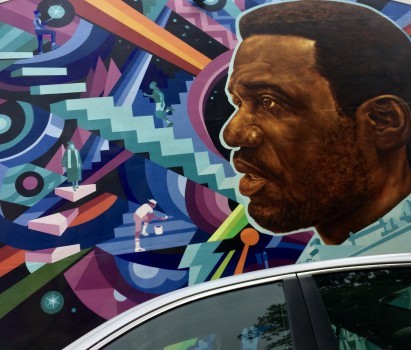 We still have a few more weeks of spring, and I’m enjoying it for the most part. All the rain helps to wash away the pollen that’s been triggering my allergies/asthma, and the weather’s been cool enough to wear a coat. Yesterday it rained almost all day yet I still had an excellent afternoon in Philly. I hit the post office and mailed out copies of THE RETURN before catching my train; we got in a little late but I got up to Mt. Airy in just fifteen minutes and toured my first apartment. The neighborhood was stunning—and so green! Huge Victorian mansions on tree-lined blocks…quiet, clean. The agent who showed me the apartment was nice, but the unit was too small. I walked over to the second apartment; it was huge but on the first floor, and I need the light and quiet that comes from being on the top floor. The agents mentioned how many New Yorkers are moving to Philly; I hate to be part of the next wave of gentrification, but Mt. Airy seems like a diverse area. I’m hoping my arrival won’t displace anyone. I talked to a third agent and then walked down Germantown Avenue—so serene in the rain. And so many beautiful murals! I snapped this photo later in the day on my way to Reading Terminal Market. On my way to the Black Writers Museum I passed a few historic houses—Cliveden, Upsal—and stopped at one for a tour. Johnson House was a station on the Underground Railroad and it was nice to see a portrait of Sarah Bass Allen as part of the exhibit on abolitionist women. The wonderful docent gave me some tips on pursuing my own genealogical research and was excited to learn that I write for kids. I can see several Philly books in my future…I’m ready for a change. Two trips this month, two final gigs in June, ALA in New Orleans, and then it’ll be time to pack!
We still have a few more weeks of spring, and I’m enjoying it for the most part. All the rain helps to wash away the pollen that’s been triggering my allergies/asthma, and the weather’s been cool enough to wear a coat. Yesterday it rained almost all day yet I still had an excellent afternoon in Philly. I hit the post office and mailed out copies of THE RETURN before catching my train; we got in a little late but I got up to Mt. Airy in just fifteen minutes and toured my first apartment. The neighborhood was stunning—and so green! Huge Victorian mansions on tree-lined blocks…quiet, clean. The agent who showed me the apartment was nice, but the unit was too small. I walked over to the second apartment; it was huge but on the first floor, and I need the light and quiet that comes from being on the top floor. The agents mentioned how many New Yorkers are moving to Philly; I hate to be part of the next wave of gentrification, but Mt. Airy seems like a diverse area. I’m hoping my arrival won’t displace anyone. I talked to a third agent and then walked down Germantown Avenue—so serene in the rain. And so many beautiful murals! I snapped this photo later in the day on my way to Reading Terminal Market. On my way to the Black Writers Museum I passed a few historic houses—Cliveden, Upsal—and stopped at one for a tour. Johnson House was a station on the Underground Railroad and it was nice to see a portrait of Sarah Bass Allen as part of the exhibit on abolitionist women. The wonderful docent gave me some tips on pursuing my own genealogical research and was excited to learn that I write for kids. I can see several Philly books in my future…I’m ready for a change. Two trips this month, two final gigs in June, ALA in New Orleans, and then it’ll be time to pack!
The We’re the People 2018 Summer Reading List is out, and I’m honored that A WISH AFTER MIDNIGHT is on the young adult list. I love their mission and the fact that they don’t focus on new releases from the Big 5—this is a truly inclusive list!
Are you looking for a curated summer reading list that celebrates diversity and all its intersections? The team at We’re the People select books that are by and about IPOC (Indigenous and People of Color), people with disabilities and people from the LGBTQ+ community. Chosen books are thoroughly discussed, vetted and given second reads.
WTP team members: Tad Andracki, Edith Campbell, Laura M. Jimenez, Alia Jones, Sujei Lugo, Lyn Miller-Lachmann & Sonia Alejandra Rodriguez
May 12, 2018
Nyla’s back!
 I finally self-published THE RETURN! If you haven’t read THE DEEP, this news might not excite you but when I show slides of the book’s interior illustrations, they get an enthusiastic response from young readers. I’m reading Children of Blood & Bone right now (it’s good!) and hope speculative fiction narratives set in Africa can correct at least some of the misperceptions that many African American youth have about the people, history, and cultures of the continent. You can learn more about THE RETURN in my latest newsletter. This is my most expensive self-published book (it’s $18), but I’m glad I tried a hybrid illustrated novel. It was great to work with Christina Myrvold again (she did that amazing cover for MOTHER OF THE SEA). Maybe the next installment in Nyla’s story will be a proper graphic novel…
I finally self-published THE RETURN! If you haven’t read THE DEEP, this news might not excite you but when I show slides of the book’s interior illustrations, they get an enthusiastic response from young readers. I’m reading Children of Blood & Bone right now (it’s good!) and hope speculative fiction narratives set in Africa can correct at least some of the misperceptions that many African American youth have about the people, history, and cultures of the continent. You can learn more about THE RETURN in my latest newsletter. This is my most expensive self-published book (it’s $18), but I’m glad I tried a hybrid illustrated novel. It was great to work with Christina Myrvold again (she did that amazing cover for MOTHER OF THE SEA). Maybe the next installment in Nyla’s story will be a proper graphic novel…
May 8, 2018
rude awakening
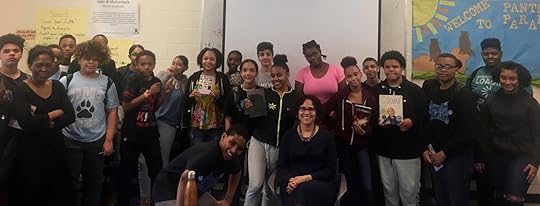 I spent a couple of days in Boston last week and met some wonderful students and educators. This photo was taken at John W. McCormack MS where students had read BIRD. Wondermore arranged the trip and their thoughtfulness made the seven book talks flow smoothly. Today I have my last school gig up in the Bronx. Another nonprofit I’ve worked with for a decade took to heart my complaint that teachers seemed not to know about the 30 books I’ve published for young readers. BIRD is a good book and I’m happy to share the story behind the story. But it troubles me that of all my books, educators and literacy advocates—mostly White women—keep choosing the one about addiction. What do kids want to read? Fantasy and sci-fi. I was happy to see that the elementary-age kids in Boston had read MILO’S MUSEUM and MELENA’S JUBILEE, and that’s the book I’m focusing on today. But again—neither of those books is fantasy fiction. In a post-Harry Potter world, why is there still bias against fantastic tales? I know that BIRD is the only title of mine available through First Book so that explains in part why it’s still in high demand. I’ve tried unsuccessfully for years to have my Rosetta Press titles added to their discount marketplace since these are the community members they serve:
I spent a couple of days in Boston last week and met some wonderful students and educators. This photo was taken at John W. McCormack MS where students had read BIRD. Wondermore arranged the trip and their thoughtfulness made the seven book talks flow smoothly. Today I have my last school gig up in the Bronx. Another nonprofit I’ve worked with for a decade took to heart my complaint that teachers seemed not to know about the 30 books I’ve published for young readers. BIRD is a good book and I’m happy to share the story behind the story. But it troubles me that of all my books, educators and literacy advocates—mostly White women—keep choosing the one about addiction. What do kids want to read? Fantasy and sci-fi. I was happy to see that the elementary-age kids in Boston had read MILO’S MUSEUM and MELENA’S JUBILEE, and that’s the book I’m focusing on today. But again—neither of those books is fantasy fiction. In a post-Harry Potter world, why is there still bias against fantastic tales? I know that BIRD is the only title of mine available through First Book so that explains in part why it’s still in high demand. I’ve tried unsuccessfully for years to have my Rosetta Press titles added to their discount marketplace since these are the community members they serve:
Head Start
Title I or Title I eligible School
USDA Food and Nutrition Program
Federally Qualified Health Center
Title VII recipient
Military family support program
Library with an E-rate of 90
A program primarily serving children with disabilities
A program where at least 70% of children come from low-income families.
I’ve started offering a substantial discount to nonprofits. They want to provide my books for the schools they serve and if First Book won’t make that possible, I’ve got to do it myself…
I came back from Boston and found a beautiful card from my friend in London. Unfortunately, it contained sad news—she has terminal pancreatic cancer. I went through several stages of grief over the weekend. I’m better now and was able to write a letter telling Mary how grateful I am for her friendship. But I still get teary and then angry…it’s so unfair. Apparently I got dragged on Twitter last week for my Dear Martin critique. Folks familiar with academic conventions know that literary criticism isn’t intended as an attack against a particular author; it’s a way of expanding the conversation around larger themes or trends. Mary is a scholar who specializes in African American women’s literature. She twice treated me to high tea at Brown’s Hotel, and I later incorporated that experience into THE GHOSTS IN THE CASTLE. She taught that novel in her class and invited me to speak to her students in London last fall. I emailed her last month to see if she wanted to go to Paris with me to see the Black doll exhibit…everything can change in an instant. Say what you mean and get your work done. Leave a legacy that matters…
April 25, 2018
no more “Becky books”
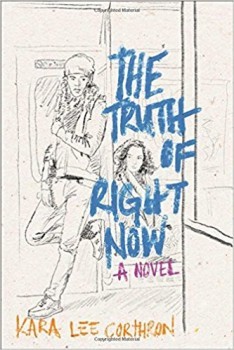 When a friend asked me last fall to address the problems she found in Dear Martin, I hedged. Few people thanked me for pointing out the issues I had with All American Boys (though many were quick to praise Jason Reynolds for his “gracious” response), and I didn’t want to become known for “targeting” or “picking on” Black authors when so few of us manage to get published. But in the end, I decided something needed to be said because I’ve noticed a disturbing trend in publishing: novels by Black authors about police violence against Black boys where White girls take center stage. I decided not to blog about The Truth of Right Now (2017) by Kara Lee Corthron when I read it last fall. Another friend urged me to read that YA novel; he found the writing superior to The Hate You Give (2017) and couldn’t understand why it wasn’t garnering equal attention. It’s a very different kind of story; a White girl attempts suicide after being raped and exploited by a White male teacher at her high school; when Lily meets Dari, an artistic Black boy with an abusive father and absent mother, her outlook on life changes and she invites him to move in with her and her mother. Dari then becomes the object of desire for both mother and daughter, and the novel concludes with an ugly confrontation in the street with police. When Lily denies knowing Dari, he is brutalized by police and hospitalized. It was clear to me why this novel didn’t achieve the blockbuster status of THUG, and I wondered why such a strong writer would choose to tell this particular story. I support the right of artists to create freely, but with so few Black female YA authors getting published (see Edith Campbell’s research), it’s frustrating to see several choosing to put the focus on Black boys and White girls. Where does that leave Black girls?
When a friend asked me last fall to address the problems she found in Dear Martin, I hedged. Few people thanked me for pointing out the issues I had with All American Boys (though many were quick to praise Jason Reynolds for his “gracious” response), and I didn’t want to become known for “targeting” or “picking on” Black authors when so few of us manage to get published. But in the end, I decided something needed to be said because I’ve noticed a disturbing trend in publishing: novels by Black authors about police violence against Black boys where White girls take center stage. I decided not to blog about The Truth of Right Now (2017) by Kara Lee Corthron when I read it last fall. Another friend urged me to read that YA novel; he found the writing superior to The Hate You Give (2017) and couldn’t understand why it wasn’t garnering equal attention. It’s a very different kind of story; a White girl attempts suicide after being raped and exploited by a White male teacher at her high school; when Lily meets Dari, an artistic Black boy with an abusive father and absent mother, her outlook on life changes and she invites him to move in with her and her mother. Dari then becomes the object of desire for both mother and daughter, and the novel concludes with an ugly confrontation in the street with police. When Lily denies knowing Dari, he is brutalized by police and hospitalized. It was clear to me why this novel didn’t achieve the blockbuster status of THUG, and I wondered why such a strong writer would choose to tell this particular story. I support the right of artists to create freely, but with so few Black female YA authors getting published (see Edith Campbell’s research), it’s frustrating to see several choosing to put the focus on Black boys and White girls. Where does that leave Black girls?
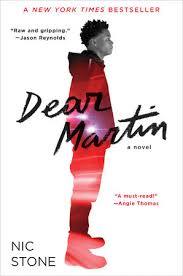 On Monday night PBS aired a documentary about the last few weeks of Martin Luther King, Jr.’s life. The camera crew was given permission to sit in on planning meetings for the Poor People’s Campaign. King was assassinated before he could lead their march on Washington, but the footage reveals how much his colleagues loved and respected him. They were also quick to come to his defense when more radical Black Power activists leveled accusations of irrelevancy and the ineffectiveness of a nonviolent strategy. Earlier that day, before I presented at Eagle Academy for Young Men in Brooklyn, I asked the room full of Black boys how many considered King their role model: three 7th graders slowly raised their hands. I told them about Dear Martin, admitted I found it troubling, and then asked, “How many of you could see yourselves writing letters to Malcolm X?” Almost every boy in the room shot his hand into the air. It’s no surprise that this bestselling novel isn’t titled Dear Malcolm (or Dear Nat, or Dear Marcus). King remains the favored civil rights leader of most Whites (and some conservative Blacks) who wrongly fix him in the moment of his 1963 “I Have a Dream Speech” and ignore King’s later, more radical vision that condemned not just racism but capitalism and the Vietnam War. King grew up in the Black church, married a Black woman, raised his family in a Black neighborhood, led a Black congregation, mobilized and served Black communities across the US and beyond. He attended a historically Black college (Morehouse) and was clearly driven by his love for his people. We can’t talk about King in 2018 without acknowledging the evolution of his ideas, the sanitizing of his image, and his limitations. He was a philanderer, a fact represented in Ava DuVernay’s 2016 film Selma. Like King, the teen protagonist in Dear Martin is from Atlanta but, as far as I can tell, that’s where the similarities end.
On Monday night PBS aired a documentary about the last few weeks of Martin Luther King, Jr.’s life. The camera crew was given permission to sit in on planning meetings for the Poor People’s Campaign. King was assassinated before he could lead their march on Washington, but the footage reveals how much his colleagues loved and respected him. They were also quick to come to his defense when more radical Black Power activists leveled accusations of irrelevancy and the ineffectiveness of a nonviolent strategy. Earlier that day, before I presented at Eagle Academy for Young Men in Brooklyn, I asked the room full of Black boys how many considered King their role model: three 7th graders slowly raised their hands. I told them about Dear Martin, admitted I found it troubling, and then asked, “How many of you could see yourselves writing letters to Malcolm X?” Almost every boy in the room shot his hand into the air. It’s no surprise that this bestselling novel isn’t titled Dear Malcolm (or Dear Nat, or Dear Marcus). King remains the favored civil rights leader of most Whites (and some conservative Blacks) who wrongly fix him in the moment of his 1963 “I Have a Dream Speech” and ignore King’s later, more radical vision that condemned not just racism but capitalism and the Vietnam War. King grew up in the Black church, married a Black woman, raised his family in a Black neighborhood, led a Black congregation, mobilized and served Black communities across the US and beyond. He attended a historically Black college (Morehouse) and was clearly driven by his love for his people. We can’t talk about King in 2018 without acknowledging the evolution of his ideas, the sanitizing of his image, and his limitations. He was a philanderer, a fact represented in Ava DuVernay’s 2016 film Selma. Like King, the teen protagonist in Dear Martin is from Atlanta but, as far as I can tell, that’s where the similarities end.
We meet Justyce late at night; why he was given that name, I’m not sure. He follows news reports of young Black men killed by police, but doesn’t seem engaged in any kind of activism despite plans to earn a law degree and work on social policy. Wearing a hoodie from his prep school and earbuds, Jus is on his way to rescue his on-again-off-again girlfriend. He finds Melo in a parking lot, drunk but determined to drive her red sports car home. Jus’s best friend Manny advised against acting as “Captain Save-A-Ho” (4) but Jus knows his ex is vulnerable. Plus he “can’t deny Melo’s the finest girl he’s ever laid eyes—not to mention hands-–on” (5). We soon learn that Melo has her White mother’s “milky Norwegian complexion, wavy hair the color of honey, and amazing green eyes that are kind of purple around the edge;” thanks to her Black NFL player father, Melo also has “really full lips, a small waist, crazy curvy hips, and probably the nicest butt Jus has ever seen in his life” (5). Melo resists Jus’ efforts to help her but after vomiting on him and spitting in his face, he manages to get her—literally kicking and screaming—into the back seat of her car. And then, of course, the police show up and Jus is cuffed by a cop named Castillo on suspicion of attempting to carjack a White woman. Throughout the arrest/assault, Melo says nothing to defend Jus.
Last night at dinner I handed Dear Martin to my Black feminist friend and had her read the passage describing Melo. She handed me back the book and said, “So at age 15, that’s the point where I would have stopped reading this book.” It took a real effort for me to finish reading it, and throughout I wondered, “How would a Black girl feel while reading this book? Invested? Invisible? Indifferent?” We never learn how Melo identifies in terms of race; she only utters about 100 words in the entire book, and it’s implied (by Manny) that she has cheated on Jus with other guys. Jus admits that he uses Melo to enhance his status: “There’s a lot of stuff Manny has that Justyce doesn’t—two parents with six-figure salaries, a basement apartment, a badass car, crazy confidence…What does Justyce have? The hottest girl in school” (17).
Traumatized by the encounter with Officer Castillo, Justyce starts an “experiment.” It’s unclear to me why Justyce chooses to write letters to Martin Luther King, Jr. and by the end of the novel, Jus can’t understand his motivations either. It seems at the outset that Jus wants to know how to “turn the other cheek” and remain nonviolent while being harassed or brutalized simply for being Black. King is rarely quoted in the novel, but when Jus is asked to dress like a “thug” for Halloween alongside one White “friend” in his crew wearing a Klan robe and hood, Jus swallows his perfectly reasonable objections, declaring “it’s cool” because “he stumbled upon Martin’s definition of integration—‘intergroup and interpersonal living’—and decided to just go with it. He’s not sure this is exactly what Martin meant, but what is he supposed to say?” (41-42).
There are plenty of moments in this novel that strain credulity. Of course, the photos taken during Halloween come back to bite Jus; later in the novel, the lawyer of the cop who shot him and killed Manny uses the photo to argue Jus was a menace to society. Black girls are rarely mentioned in Dear Martin, and the conversations about them are equally problematic. Manny invites Jus to join the circle of racist rich White boys that Manny has considered friends for years, but it’s to Jus that Manny makes this unexpected confession: “I’m scared of black girls, man” (72). Despite being described by his White “friend” Jared as “a titan with the ladies” (208), Manny dreads interaction with Black girls because his cousins are “real attitude-y” and “kinda…ghetto” (72). As an incoming freshman at Morehouse, Manny worries about his ability to relate to his Black classmates when he has only ever had White friends. Jus reassures him: “You’ll be fine, man. I’m sure there’ll be plenty of dudes you’ll vibe with at Morehouse just like you vibe with me” (73). But when it comes to Manny’s anxiety about the Black women at Spelman, Jus falters: “It’s not like he has any experience in this area either. Melo’s half black, but she’s def not the type of girl Manny’s talking about” (72). Ultimately, Jus hazards a guess: “All I can say is they’re not all alike, just like we aren’t” (73).
I attended PWIs (predominantly White institutions) for my entire academic career but I’m not from the South, so I asked some friends from Atlanta how likely it is that two Black teenage boys from working-class and upper middle-class backgrounds wouldn’t know any Black girls; all responded that it was highly unlikely. Why is it that Manny’s parents, Black professionals and members of the country club, never had “the talk” with their seventeen-year-old son until shortly before his DWB death? In my experience, Black girls outnumber Black boys at elite schools so it wouldn’t have been a stretch to have a Black girl on Justyce’s debate team. Or she could have been on a team from another prep school—at least one such Black girl exists in the book, though she’s referenced in a derogatory way by Blake (wearer of the KKK costume). He invites Manny and Jus to his birthday party but then immediately asks for their help: “‘There’s this fine-ass black girl here from Decatur Prep, and I was thinking you guys could wingman it up for me and shit. Homegirl’s got the fattest ass I’ve ever seen, and I think if she meets my niggas, I’ll have a good chance of getting’ [sic] her upstairs. You feel me dogs?'” (90). Despite not knowing any Black girls, Jus takes offense; drunk and sick of the White boys’ liberties and slurs, Jus slugs Blake and calls Manny a sellout. Manny subsequently quits the basketball team and slugs Jared. Jared’s father presses charges, Jus goes for a ride with Manny in his Range Rover, and his best friend loses his life.
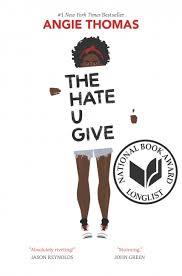 One thing Angie Thomas did well in The Hate You Give was to provide Star with a diverse community. Like Jus, Star has racist and “woke” White classmates in addition to friends of color at her elite school. But Star doesn’t live on campus and so she stays connected to and gets support from her large extended family, neighbors, and community activists. All help to shape her worldview, whereas Jus has only an overworked, largely absent mother. When Jus needs to talk, he goes home but finds his mother more interested in watching Judge Judy (84); when he tries to talk to her about police violence and his struggles at school, his mother goes back to reading her book after unsympathetically reminding Jus, “‘I didn’t raise you to punk out when the going gets rough'” (36). By comparison, the parents of SJ and Manny adore Jus, welcoming him into their wealthy homes, hugging him, and even cooking his favorite meal. When his mother urges Jus to keep his White female classmate as a friend and nothing more, Jus shuts down but “wants to call Mama on her prejudice. Tell her, in his mind, she’s just as bad as the guy who shot him and Manny” (130). That’s right—his Black mother is JUST AS BAD as Tison, the White off-duty cop who shot two Black teens for playing their music too loud. This isn’t the only false equivalency. Jus’s only childhood friend, Quan, is a gang member in prison for shooting Castillo. Quan is also the cousin of Manny, and while visiting him in prison Jus learns that Tison saw Quan kill his partner (Castillo). Jus then wonders—rather charitably—whether Tison shot into their vehicle because he was suffering from PTSD, just like Jus’s army veteran father who used to get drunk and beat his mother (142). When Jus decides to meet with the head of Quan’s gang, Jus leaves his valuables at school and then chides himself for being part of the problem: “How can he be mad at white people for profiling when he’s doing the same damn thing they do?” (158). By this point in the novel I wouldn’t have been surprised if Jus made a case for “reverse racism” and attributed it to King.
One thing Angie Thomas did well in The Hate You Give was to provide Star with a diverse community. Like Jus, Star has racist and “woke” White classmates in addition to friends of color at her elite school. But Star doesn’t live on campus and so she stays connected to and gets support from her large extended family, neighbors, and community activists. All help to shape her worldview, whereas Jus has only an overworked, largely absent mother. When Jus needs to talk, he goes home but finds his mother more interested in watching Judge Judy (84); when he tries to talk to her about police violence and his struggles at school, his mother goes back to reading her book after unsympathetically reminding Jus, “‘I didn’t raise you to punk out when the going gets rough'” (36). By comparison, the parents of SJ and Manny adore Jus, welcoming him into their wealthy homes, hugging him, and even cooking his favorite meal. When his mother urges Jus to keep his White female classmate as a friend and nothing more, Jus shuts down but “wants to call Mama on her prejudice. Tell her, in his mind, she’s just as bad as the guy who shot him and Manny” (130). That’s right—his Black mother is JUST AS BAD as Tison, the White off-duty cop who shot two Black teens for playing their music too loud. This isn’t the only false equivalency. Jus’s only childhood friend, Quan, is a gang member in prison for shooting Castillo. Quan is also the cousin of Manny, and while visiting him in prison Jus learns that Tison saw Quan kill his partner (Castillo). Jus then wonders—rather charitably—whether Tison shot into their vehicle because he was suffering from PTSD, just like Jus’s army veteran father who used to get drunk and beat his mother (142). When Jus decides to meet with the head of Quan’s gang, Jus leaves his valuables at school and then chides himself for being part of the problem: “How can he be mad at white people for profiling when he’s doing the same damn thing they do?” (158). By this point in the novel I wouldn’t have been surprised if Jus made a case for “reverse racism” and attributed it to King.
Jus ultimately uses his letter-writing experiment to justify his desire for SJ, his White female debate partner: “she’s gorgeous for a white girl—she’s tall with long brown hair, and while not a big-booty Betty, the lacrosse body is tight” (51). It was SJ’s attorney mother who got him released from police custody that night, and she demonstrates during a class on racial equality that she’s clearly “woke.” Though his own mother has warned him not to bring home a White girl (apparently without explaining the history of lynching), Jus is drawn to Sarah Jane (“She’s Jewish! She knows about oppression!”) and Manny implies that King would have sanctioned their interracial relationship: “‘If you’re doing this Be Like Martin thing, do it for real. Refusing to date a girl because she’s white is probably not the Kingly way, bruh'” (74). Jus goes for it but gets unexpectedly rebuffed when he tries to kiss SJ; he writes to King, of course, to report on his “failed attempt at ‘romantic integration'” (82) but after his near-death experience, Jus decides “to let his instincts lead” (165) and they lead him to SJ. At the end of the novel, Jus is at another PWI (Yale) and SJ is close by at Columbia. Jus no longer wants to be like Martin and is committed to the path he’s on, telling Jared (who’s now minoring in Black Studies), “That girl is gonna have my babies one day, dawg” (208). Though Jared contributed to the circumstances surrounding Manny’s death, all is forgiven in the end!
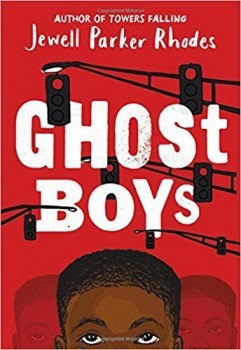 Had a White woman written this book, I wouldn’t have been surprised. If it had been set in MAINE, it would have made more sense. But for the author to be a Black woman—an Atlanta native AND a Spelman grad—is perplexing. Almost as disappointing is the long list of YA authors whose rapturous blurbs decorate the novel’s front and back cover. When I told a scholar friend about my concerns with Dear Martin, she warned me about “another Sarah” in Ghost Boys (2018) by Jewell Parker Rhodes. I’m about done with these “Becky books” and hope the editors green lighting these projects are giving equal consideration to stories about police violence against Black women and girls. I’m very glad that I’ve got a Black woman editor working on …
Had a White woman written this book, I wouldn’t have been surprised. If it had been set in MAINE, it would have made more sense. But for the author to be a Black woman—an Atlanta native AND a Spelman grad—is perplexing. Almost as disappointing is the long list of YA authors whose rapturous blurbs decorate the novel’s front and back cover. When I told a scholar friend about my concerns with Dear Martin, she warned me about “another Sarah” in Ghost Boys (2018) by Jewell Parker Rhodes. I’m about done with these “Becky books” and hope the editors green lighting these projects are giving equal consideration to stories about police violence against Black women and girls. I’m very glad that I’ve got a Black woman editor working on …
April 22, 2018
“Tell Me What Democracy Looks Like!”
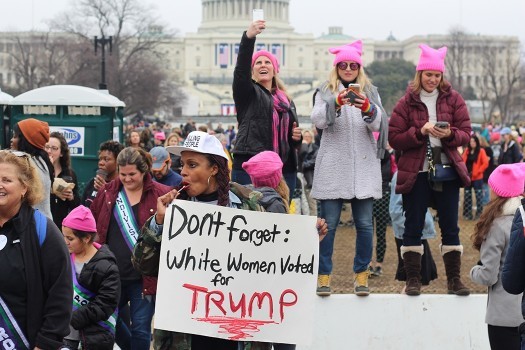 I used this photograph by Kevin Banatte for the opening slide in my panel presentation at NYU on Friday. I wasn’t sure I’d fit in when I arrived at Deutsches Haus at NYU, but as soon as I walked in the door I got a warm welcome. I met my fellow panelists and we had a lively conversation about US politics before the panel began. The title was taken from a popular chant used at the Women’s March in 2016 (“Tell me what democracy looks like! THIS is what democracy looks like!), but that event was fraught for many women of color, and I used this image to reflect
I used this photograph by Kevin Banatte for the opening slide in my panel presentation at NYU on Friday. I wasn’t sure I’d fit in when I arrived at Deutsches Haus at NYU, but as soon as I walked in the door I got a warm welcome. I met my fellow panelists and we had a lively conversation about US politics before the panel began. The title was taken from a popular chant used at the Women’s March in 2016 (“Tell me what democracy looks like! THIS is what democracy looks like!), but that event was fraught for many women of color, and I used this image to reflect 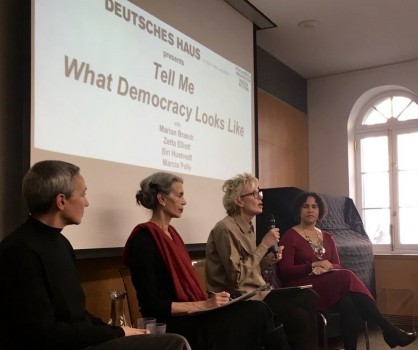 that tension. When it was my turn to speak, I only got through half of the slides I’d prepared and I was the only one who got up to stand at the podium. But I think my critique of White women’s dominance within the children’s publishing industry resonated with quite a few attendees. Lyn Miller-Lachmann attended the panel and wrote a fantastic summary, which you can read over at her blog. She notes that a line formed at the end of our event, and I was happy to meet so many people who appreciated my remarks. A few folks asked if I would consider speaking at their events or workplaces—yes! That’s the thing about stepping out of your comfort zone. No one expected to hear a Black woman telling White women to do better, but the risk was worth it because at least a few heads were nodding as I spoke. My host, Jaira Placide, took me out to dinner later than evening and we got back to Brooklyn after midnight. I was wiped out the next day but I also felt more focused. This introvert doesn’t like to socialize all that much, but sometimes you have to let in other voices in order to hear your own voice more clearly…
that tension. When it was my turn to speak, I only got through half of the slides I’d prepared and I was the only one who got up to stand at the podium. But I think my critique of White women’s dominance within the children’s publishing industry resonated with quite a few attendees. Lyn Miller-Lachmann attended the panel and wrote a fantastic summary, which you can read over at her blog. She notes that a line formed at the end of our event, and I was happy to meet so many people who appreciated my remarks. A few folks asked if I would consider speaking at their events or workplaces—yes! That’s the thing about stepping out of your comfort zone. No one expected to hear a Black woman telling White women to do better, but the risk was worth it because at least a few heads were nodding as I spoke. My host, Jaira Placide, took me out to dinner later than evening and we got back to Brooklyn after midnight. I was wiped out the next day but I also felt more focused. This introvert doesn’t like to socialize all that much, but sometimes you have to let in other voices in order to hear your own voice more clearly…
April 20, 2018
the real deal
 It’s official! This notice was posted in Publishers Weekly yesterday. “Femme” is used incorrectly here, so we’ll fix that going forward. So many people have shown support on social media and I really appreciate the excitement around this book and this deal. I do, however, want to situate my personal success within the larger context of what’s happening in children’s publishing. I cringe when people say, “All that hard work finally paid off!” Because there are so many writers who work hard and never get a book deal due to systemic bias in the industry. Publishing is not a meritocracy—it takes more than talent to get published. Here’s a summary of the 2017 statistics compiled by the CCBC:
It’s official! This notice was posted in Publishers Weekly yesterday. “Femme” is used incorrectly here, so we’ll fix that going forward. So many people have shown support on social media and I really appreciate the excitement around this book and this deal. I do, however, want to situate my personal success within the larger context of what’s happening in children’s publishing. I cringe when people say, “All that hard work finally paid off!” Because there are so many writers who work hard and never get a book deal due to systemic bias in the industry. Publishing is not a meritocracy—it takes more than talent to get published. Here’s a summary of the 2017 statistics compiled by the CCBC:
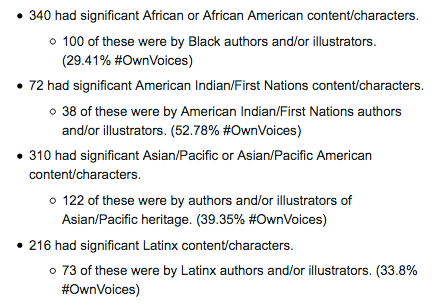 Please don’t assume that folks who haven’t gotten a book deal simply aren’t trying hard enough or don’t have enough talent. We’ll never know how many gifted storytellers simply gave up because the door was closed in their face over and over again. I’m happy my poetry collection will find its way into the world, but I also know that 90% of the folks celebrating on social media would be silent if I self-published this exact same book. We’ve got a lot of work to do…
Please don’t assume that folks who haven’t gotten a book deal simply aren’t trying hard enough or don’t have enough talent. We’ll never know how many gifted storytellers simply gave up because the door was closed in their face over and over again. I’m happy my poetry collection will find its way into the world, but I also know that 90% of the folks celebrating on social media would be silent if I self-published this exact same book. We’ve got a lot of work to do…
April 18, 2018
spring blessings
 It doesn’t feel like spring but the cold temperatures aren’t getting me down. I’ve been visiting the botanic garden regularly and it’s heartening to see the daffodils, and tulips, and magnolia trees in bloom. Today when I got back from the garden I found this message in my inbox:
It doesn’t feel like spring but the cold temperatures aren’t getting me down. I’ve been visiting the botanic garden regularly and it’s heartening to see the daffodils, and tulips, and magnolia trees in bloom. Today when I got back from the garden I found this message in my inbox:
I am pleased to inform you that Benny Doesn’t Like to Be Hugged has been chosen as a 2018-2019 Great Words, Great Works title by the Scripps National Spelling Bee…The Bee curates the Great Words, Great Works list annually to provide teachers with grade-level appropriate reading recommendations that cover a variety of genres and topics, from classic to contemporary, fiction to nonfiction. Every word on the 2018-2019 School Spelling Bee Study List can be found in one of the books from the corresponding grade level. Nearly 11 million students across the country in the 1st through 8th grades use this list to prepare for their classroom and school spelling bees. Benny Doesn’t Like to Be Hugged has been selected as a 1st grade fiction book.
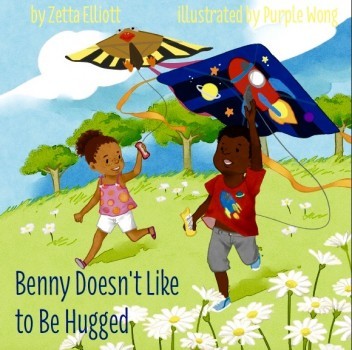 I don’t remember participating in a spelling bee as a child, but I do remember reading textbooks that had vocabulary words highlighted. This approach seems much better—each grade gets a list of recommended books that use the spelling bee words in a more organic way. I’m so happy that Benny made the list!
I don’t remember participating in a spelling bee as a child, but I do remember reading textbooks that had vocabulary words highlighted. This approach seems much better—each grade gets a list of recommended books that use the spelling bee words in a more organic way. I’m so happy that Benny made the list!
The official announcement will come out in Publishers Weekly, but last Friday we sold SAY HER NAME! I’m actually *still* writing poems and hope to have 40 done by the time I meet with my editor. I can already SEE this book in my mind’s eye…it’s going to be beautiful!
I filed taxes on Monday and was pleased to see my gross income rise considerably from the year before. I don’t make anywhere close to what I earned as a professor, but this writing life is working out…
April 9, 2018
Kweli 2018
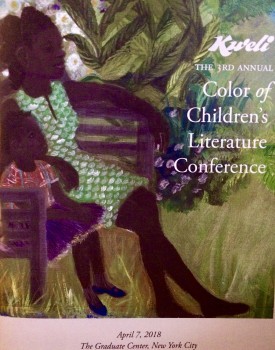 Kweli was magical once again! It’s so rare for IPOC kid lit creators to have a space in which we make up the majority. And when we’re gathered together, the energy is amazing. The day started with laughter as Angela Johnson talked about her misadventures during school visits, then there were hugs as I reconnected with out-of-town friends and met some new authors. Our panel on chapter books and early middle grade novels was expertly moderated and reflected multiple perspectives, as did our afternoon panel on querying agents. I always feel the need to talk about my self-publishing experience and I really hope future conferences will bring more indie authors to the table. I met so many self-published authors, many of whom had their books with them; yet they only came up to me after I’d shared my perspective. Yet there was no panel on self-publishing and that’s really the only or best option for a lot of writers these days. I did feel at times
Kweli was magical once again! It’s so rare for IPOC kid lit creators to have a space in which we make up the majority. And when we’re gathered together, the energy is amazing. The day started with laughter as Angela Johnson talked about her misadventures during school visits, then there were hugs as I reconnected with out-of-town friends and met some new authors. Our panel on chapter books and early middle grade novels was expertly moderated and reflected multiple perspectives, as did our afternoon panel on querying agents. I always feel the need to talk about my self-publishing experience and I really hope future conferences will bring more indie authors to the table. I met so many self-published authors, many of whom had their books with them; yet they only came up to me after I’d shared my perspective. Yet there was no panel on self-publishing and that’s really the only or best option for a lot of writers these days. I did feel at times 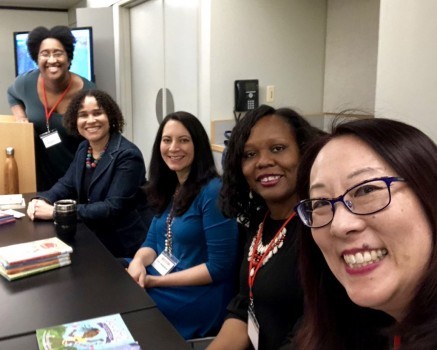 that we were doing attendees a disservice by focusing on NY Times bestselling authors and not situating their individual success within the larger context of an industry that has longstanding and ongoing bias against so many IPOC, disabled, and LGBTQ creators. It’s not enough to tell aspiring authors to keep trying; we need to talk about structural problems and how they can be corrected. I really appreciated Emma Otheguy‘s remarks about the “culture of prestige”
that we were doing attendees a disservice by focusing on NY Times bestselling authors and not situating their individual success within the larger context of an industry that has longstanding and ongoing bias against so many IPOC, disabled, and LGBTQ creators. It’s not enough to tell aspiring authors to keep trying; we need to talk about structural problems and how they can be corrected. I really appreciated Emma Otheguy‘s remarks about the “culture of prestige” 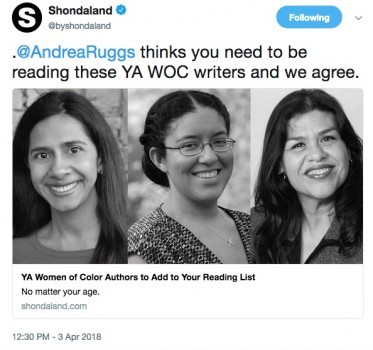 and how we tend to focus on starred reviews and award-winning books to the exclusion of the vast majority of books that don’t receive equal attention. I urged attendees to define success for themselves and remember for whom you write because otherwise you can end up feeling very demoralized very quickly–especially in the company of other kid lit creators.
and how we tend to focus on starred reviews and award-winning books to the exclusion of the vast majority of books that don’t receive equal attention. I urged attendees to define success for themselves and remember for whom you write because otherwise you can end up feeling very demoralized very quickly–especially in the company of other kid lit creators.
This week I’m having lunch with one author friend but the rest of my outings will involve young writers. Today I’ll lead a teen writing workshop at the Kensington Branch of the BPL; on Saturday I’ll do the same at the Carroll Gardens Branch. Tomorrow I have three writing workshops in the morning followed by a free community dinner at the Corona Branch of the QPL. Last week I was elated to learn that Andrea Ruggirello included me in her list of women IPOC YA authors to watch out for. You can read the complete list over at Shondaland.com. Indie authors aren’t generally included in lists like this, so I appreciate her willingness to research overlooked authors. But you can’t make any list if you DON’T GET YOUR BOOK DONE, so this week will also be about finishing the revisions for The Return…




